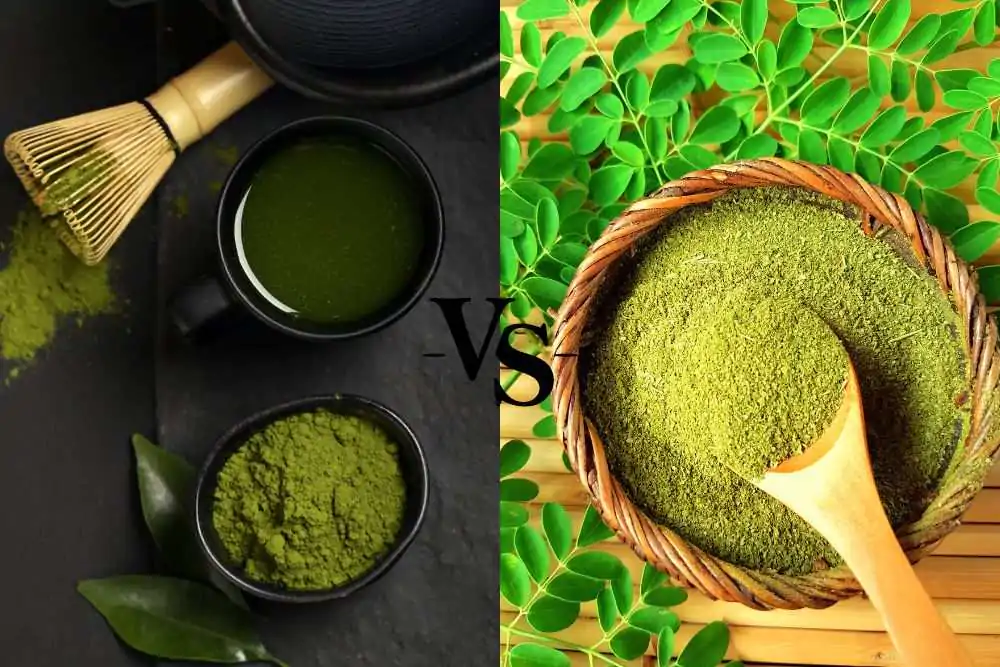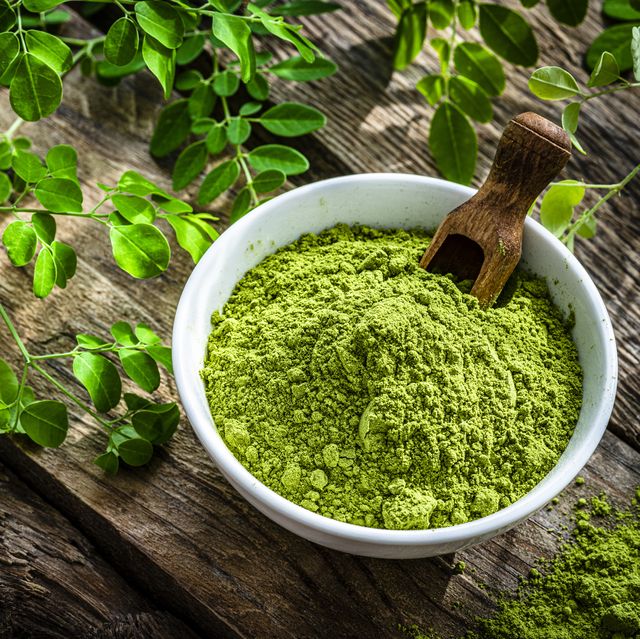In the realm of superfoods, the Miracle of Moringa stands as a beacon of nutritional prowess, revered across cultures for its remarkable health benefits and versatile applications. Let’s delve into the wondrous world of this botanical gem.
Table of Contents
Nutritional Composition and Health Benefits
Moringa is often recognized for its remarkable nutritional composition and the associated health benefits it offers. This “Miracle Tree” stands out for its exceptional richness in essential nutrients and its positive impact on well-being. Here’s a breakdown of the nutritional composition and the health benefits of moringa:
Nutritional Composition:
- Vitamins: Moringa is a vitamin powerhouse, containing significant amounts of vitamins A, C, and E. Vitamin A supports vision and skin health, vitamin C boosts immunity, and vitamin E acts as a powerful antioxidant.
- Minerals: Moringa provides essential minerals like calcium, iron, and potassium. Calcium is crucial for bone health, iron prevents anemia, and potassium regulates blood pressure and heart function.
- Protein: Moringa leaves are an excellent source of plant-based protein, containing all essential amino acids. This makes it valuable for vegetarians and vegans.
- Antioxidants: Moringa is packed with antioxidants, such as quercetin, chlorogenic acid, and beta-carotene. These compounds combat free radicals, reducing oxidative stress and inflammation.
- Dietary Fiber: Moringa is rich in dietary fiber, which aids digestion, promotes a feeling of fullness, and supports a healthy gut.
- Phytonutrients: It contains various phytonutrients that contribute to its health benefits, including isothiocyanates, which have anti-inflammatory and anti-cancer properties.
Health Benefits:
- Nutritional Support: Moringa acts as a nutritional supplement, filling nutrient gaps and enhancing overall health.
- Immune Boost: Its vitamins and antioxidants strengthen the immune system, aiding in the body’s defense against infections.
- Blood Sugar Control: Moringa may help regulate blood sugar levels, making it beneficial for those with diabetes.
- Heart Health: It supports cardiovascular health by reducing cholesterol levels and promoting healthy blood pressure.
- Anti-Inflammatory: Moringa’s anti-inflammatory properties help reduce chronic inflammation, a key factor in many diseases.
- Digestive Health: High fiber content aids digestion and promotes a healthy gut.
- Energy Boost: It provides natural, sustained energy without caffeine-induced crashes.
- Brain Health: Antioxidants and neuroprotective properties may enhance brain function and protect against neurodegenerative diseases.
- Skin and Hair: Vitamins A and E contribute to healthier skin and hair.
- Bone Health: The presence of calcium supports bone strength.
- Anticancer Potential: Some compounds in moringa have shown potential in inhibiting cancer cell growth.
- Anti-Aging: Antioxidants combat the signs of aging by reducing cellular damage.
- Weight Management: Dietary fiber helps with weight control by promoting a feeling of fullness.

Historical Significance and Cultural Usage
Historical Significance:
- Ancient Origins: Moringa oleifera, the species commonly used for its nutritional and medicinal properties, has ancient origins in the Indian subcontinent. It has been cultivated and utilized for thousands of years.
- Traditional Medicine: Moringa has a longstanding history as a key ingredient in traditional medicine systems such as Ayurveda in India and Unani in the Middle East. It was revered for its healing properties and was used to treat various ailments.
- Historical Records: Historical texts and documents dating back centuries mention moringa as a valuable plant. Ancient civilizations recognized its nutritional value and therapeutic benefits.
Cultural Usage:
- Culinary Traditions: Moringa leaves, pods, and flowers are used in culinary traditions in regions where it grows. It is featured in various dishes, including soups, stews, curries, and salads. Moringa leaves are often used as a leafy green vegetable.
- Tea and Beverages: Moringa leaves are used to make herbal teas and infusions in many cultures. These beverages are enjoyed for their mild flavor and health-promoting properties.
- Festival Foods: In some cultures, moringa-based dishes are prepared during festivals and special occasions, symbolizing health and abundance.
- Folklore and Beliefs: Moringa has sometimes been associated with cultural folklore and beliefs. It is considered a “tree of life” in certain communities due to its wide-ranging uses and benefits.
- Economic Importance: Moringa cultivation has economic significance in many regions. It provides livelihoods for farmers and serves as a source of income, particularly in areas with limited agricultural opportunities.
- Religious and Spiritual Significance: In some cultures, moringa trees are revered for their spiritual significance. They are planted near homes and temples, symbolizing purity and prosperity.
- Nutrition in Times of Scarcity: Moringa’s ability to thrive in arid conditions makes it a valuable source of nutrition in regions with food scarcity. Its leaves and pods are accessible sources of essential nutrients.
- Global Adaptation: Moringa’s adaptability has led to its global adoption, with cultivation and usage spreading to various parts of the world. It has become a staple in the diets of people from diverse backgrounds.
Moringa in Modern Medicine
Moringa, the “Miracle Tree,” has found its place in modern medicine and healthcare, with researchers and medical professionals recognizing its potential therapeutic benefits. Its nutritional richness and bioactive compounds have led to investigations into its applications in modern medicine. Here’s a look at how moringa is making inroads in contemporary healthcare:
1. Supplementary Nutrition:
- Moringa is utilized as a supplementary source of essential nutrients, especially in regions with malnutrition concerns. It provides a convenient and sustainable way to combat nutrient deficiencies.
2. Antioxidant and Anti-Inflammatory Properties:
- Research has highlighted the antioxidant and anti-inflammatory properties of moringa. These qualities make it a subject of interest for managing inflammatory diseases and reducing oxidative stress.
3. Diabetes Management:
- Moringa has shown potential in aiding diabetes management. It may help regulate blood sugar levels and improve insulin sensitivity, offering a natural approach to diabetes care.
4. Cardiovascular Health:
- Studies suggest that moringa may contribute to cardiovascular health by lowering cholesterol levels and supporting healthy blood pressure. It has the potential to reduce the risk of heart diseases.
5. Anticancer Research:
- Some compounds in moringa have demonstrated anticancer properties in laboratory studies. Researchers are exploring its potential as an adjunct therapy in cancer treatment.
6. Antimicrobial Activity:
- Moringa’s antimicrobial properties are being investigated for their potential in combating bacterial and fungal infections. It may serve as a natural alternative to conventional antibiotics.
7. Neuroprotective Effects:
- Moringa’s neuroprotective properties are of interest in neurological research. It may play a role in protecting the brain and supporting cognitive function.
8. Wound Healing:
- Moringa extracts have been studied for their wound-healing properties. They may promote faster and more effective wound recovery.
9. Digestive Health:
- The high fiber content of moringa supports digestive health by preventing constipation and promoting a healthy gut microbiome.

Sustainability and Environmental Impact
Moringa cultivation is celebrated for its sustainability and positive environmental impact, making it a “green” choice in agriculture. Here’s an overview of how moringa contributes to sustainability and its minimal environmental footprint:
1. Drought-Resistant Crop:
- Moringa is well-suited to arid and semi-arid regions where water resources are scarce. It thrives in conditions where many other crops struggle, making efficient use of available water.
2. Reduced Land Pressure:
- Moringa’s ability to produce leaves, pods, and seeds within a relatively small area means it can help alleviate land pressure. Farmers can grow multiple moringa trees on a limited plot, freeing up land for other crops.
3. Minimal Pesticide Use:
- Moringa is naturally resistant to pests and diseases, reducing the need for chemical pesticides. This results in lower chemical inputs and less environmental pollution.
4. Nitrogen Fixation:
- Moringa trees have nitrogen-fixing properties, which means they can enrich the soil with nitrogen, benefiting neighboring plants and reducing the need for synthetic fertilizers.
5. Soil Improvement:
- Moringa’s extensive root system helps prevent soil erosion and improves soil structure, making it more fertile for other crops.
6. Sustainable Agriculture:
- Moringa can be integrated into sustainable farming practices, such as agroforestry and permaculture. It provides shade and shelter to other crops and helps create a diverse and resilient ecosystem.
7. Carbon Sequestration:
- Moringa trees absorb carbon dioxide from the atmosphere, contributing to carbon sequestration and helping mitigate climate change.
8. Nutrient-Rich Leaves:
- Moringa leaves are highly nutritious, offering a valuable source of vitamins and minerals. This nutrient density can combat malnutrition and reduce the need for importing costly supplements.
9. Local Food Security:
- Moringa’s availability and nutritional value make it a sustainable source of food security in communities where access to diverse and nutritious foods may be limited.
Culinary Uses and Recipes
Incorporating Moringa into Everyday Meals
Moringa’s versatile nature allows it to be incorporated into various dishes, from soups and salads to smoothies and teas. Its leaves, with a mildly earthy flavor, enrich the culinary experience with added nutrients.
Popular Recipes and Culinary Tips
Explore the world of moringa with these popular recipes and culinary tips that showcase the versatility and nutritional value of this “Miracle Tree”:
1. Moringa Green Smoothie:
- Blend moringa leaves or moringa powder with spinach, banana, Greek yogurt, and a touch of honey for a refreshing and nutritious green smoothie.
2. Moringa Pesto Pasta:
- Prepare a moringa-infused pesto sauce by blending moringa leaves, garlic, pine nuts, Parmesan cheese, olive oil, and a squeeze of lemon. Toss it with your favorite pasta for a vibrant dish.
3. Moringa Soup:
- Enhance your favorite soup recipes by adding moringa leaves or moringa powder. It brings a nutritional boost to your comforting bowl of soup.
4. Moringa Guacamole:
- Mix moringa powder into guacamole for a nutritious dip. Serve it with tortilla chips or as a topping for tacos.
5. Moringa Curry:
- Create a flavorful moringa curry by sautéing moringa leaves with onions, garlic, and spices like turmeric, cumin, and coriander. Serve it with rice or bread.
6. Moringa Rice:
- Add moringa powder during the cooking process to infuse your rice with nutrition and a subtle earthy flavor.
7. Moringa Salad:
- Sprinkle moringa powder on salads for a nutritional boost. It pairs well with mixed greens, tomatoes, cucumbers, and a citrus dressing.
8. Moringa Energy Bars:
- Combine moringa powder with nuts, seeds, dried fruits, and honey to make homemade energy bars. Shape into bars and refrigerate.
9. Moringa Pancakes:
- Mix moringa powder into your pancake batter for a healthful breakfast. Serve with fresh fruits and a drizzle of maple syrup.

Growing and Harvesting Moringa
Growing and harvesting moringa is a rewarding experience, as this versatile plant offers a wealth of nutritional benefits. Here’s a step-by-step guide on how to grow and harvest moringa:
1. Choose the Right Location:
- Moringa thrives in warm, tropical, and subtropical climates with temperatures between 77°F and 95°F (25°C to 35°C). Ensure your planting location receives plenty of sunlight, as moringa requires at least 6 hours of direct sunlight per day.
2. Select the Right Variety:
- Moringa oleifera is the most commonly cultivated variety for its edible leaves and pods. Choose a variety that suits your region and intended use.
3. Prepare the Soil:
- Moringa is adaptable to various soil types but prefers well-draining soil. Ensure good drainage to prevent waterlogged roots. Loosen the soil and add organic matter to improve fertility.
4. Planting Moringa Seeds:
- Plant moringa seeds directly in the ground or in large pots if you have limited space. Plant the seeds about 1 inch deep. Space them 3-5 feet apart to allow for growth.
5. Watering:
- Initially, water the newly planted seeds regularly to keep the soil consistently moist. Once the moringa plants establish themselves (usually after a few months), reduce watering as moringa is drought-tolerant.
6. Pruning and Shaping:
- Prune moringa regularly to encourage a bushy shape and make harvesting easier. Remove dead or diseased branches to maintain plant health.
7. Harvesting Leaves and Pods:
- Moringa leaves can be harvested once the tree reaches a height of about 3 feet. Use clean scissors or pruning shears to cut the leaves. Avoid taking more than one-third of the leaves from a single branch to allow for regrowth.
- Harvest pods when they are young and tender, typically between 8-18 inches in length. Overly mature pods can become tough.
8. Seed Harvesting:
- If you want to harvest moringa seeds, leave some pods on the tree until they turn brown and dry. Crack open the pods to collect the seeds.
9. Pest and Disease Management:
- Moringa is generally resistant to pests and diseases, but occasional issues may arise. Monitor the plants for any signs of infestation and treat as needed using organic pest control methods.
Source to Get Organic Moringa Leaf Powder Capsules
Conclusion
The Miracle of Moringa extends beyond its nutritional richness; it embodies a sustainable solution for health, nutrition, and ecological preservation. Its historical significance, coupled with modern scientific validation, cements its status as nature’s superfood.
